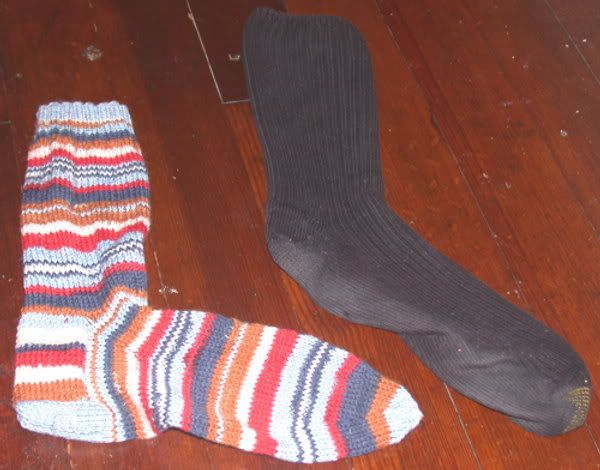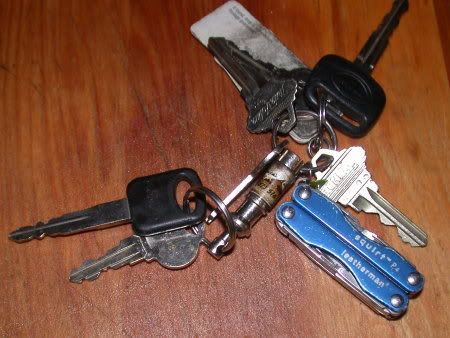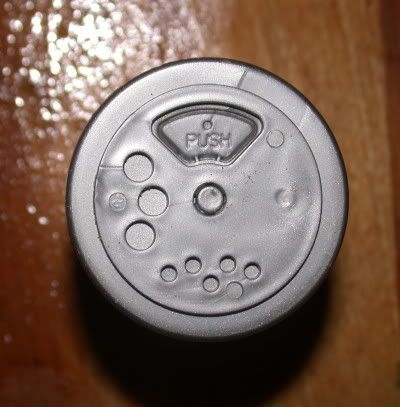On Wikipedia, I feel my best work is done in collaboration with other editors. But many of the articles I work on, no one else is working on. There is topic coverage that would not be on Wikipedia if I did not contribute. There are subjects that were peppered with misinformation (that in some cases had been there for years) before I corrected them. Especially with my recent discovery of an article hit counter (some articles I work on get thousands of page views every day), it's easy to feel that I am single-handedly improving the world's knowledge base.
But the English Wikipedia is near 2.5 million articles. While it suffers from chronic poor writing quality, it has depth of information not available anywhere else. Accuracy is spotty, but apparently good enough for people to use it in droves. Wikipedia has been blamed for the demise of a French encyclopedia, and is viewed as enough of a threat that other encyclopedias (another French one, and the the Encyclopedia Britannica) are imitating its writing model to try to compete.
My contributions to the project are an infinitesimal part of that picture. Even if I'd never made so much as a spelling correction, Wikipedia would still be in the vaunted position it is today. It's an odd feeling, to see my work as both hugely meaningful, and as completely insignificant.
Sunday, June 29, 2008
A matter of perspective
Friday, June 27, 2008
What goes in a lawn
I think most people view lawns as areas of grass, and (ideally) nothing else. There is a certain aesthetic appeal to an uniform expanse of green.
For the past month, as I drive around I see many yards with the little white balls that are clover flowers. The feed stores near us do sell clover seeds right beside the grass seeds, so in some yards this may be intentional. In many lawns, however, these flowers stop exactly at the property line. It's rather obvious which houses are using herbicides.
Which, you know, if they dislike the variegated green of yards with clover (and other plants), and don't think the white flowers are pretty: these are subjective opinions. One can't really argue with that.
I don't like the idea of heavily chemicalled lawns (they can cause serious environmental problems). With city weed ordinances and restrictive HOA covenants seeming to be everywhere, though, I often feel like I'm in the minority. But driving around and seeing half the houses with the little clover flowers: perhaps society is moving away from the idea of lawn as a monoculture, after all.
Tuesday, June 24, 2008
A secret spice
Last month, we went out to dinner at a fancier restaurant than usual. It was our fifth wedding anniversary. We discussed ordering an appetizer, and I asked my partner what he would like. He told me I should get whatever I wanted, because my menu options were so scarce (I am vegetarian).
It struck me as odd that my vegetarianism was seen as a burden. True, he, as an omnivore, had the choice of a few dozen delicious-sounding dishes. While I had the choice of three or four very appetizing dishes. I pointed out that, according to Schwartz's The Paradox of Choice, my smaller menu should make me happier with my food. Which, after reading the book, I think is true: I savor good food more now than I did before restricting myself to a vegetarian diet. But, it's not something I would have realized on my own. Self-denial is not an intuitive pathway to satisfaction with life.
In a typical week, I cook for us three times, we eat out two or three times, and our remaining meals we fend for ourselves around the house. On those nights, my partner and I often struggle with what to feed ourselves. He commented yesterday that the angst of selecting from all the food in our house was perhaps not worth it, "If all I had was wheat berries and water, I would know what I was having for dinner."
I hadn't realized this was one reason he liked my cooking. It's not just the meal preparation I do for him, it's restricting his options for dinner. I cook it, he eats it. And savors it more than he would if there were other options.
Sunday, June 22, 2008
Footwear
My mother taught me cross-stitch when I was five: I could not draw the letter 'X' and she thought the structure of the canvass would help my spatial skills. I have enjoyed needlework every since. As nifty as handmade items are, however, it's difficult to find a project that would be useful. We don't need more pictures to hang on the walls, we have enough sweaters and blankets and hats and gloves and scarves.
Many of the women in my knitting group make baby clothing. Babies always need new clothing, plus they're small, so these projects go relatively quickly. Not having any babies in my immediate family, I've found myself attracted to another popular item in this group: socks.
I have to get a few new pairs every year my old socks develop holes, and socks are worn all year round. Also, they are a medium-sized project that keeps me busy for many weeks, but doesn't seem like a never-ending task. And, there is a definite advantage to handmade over machine-knit socks: the heel.
The placement of the heel is custom to my foot, where mass-produced socks in my size run a little big on me. Even more exciting, though, the heel is actually square. The sharper angled heel stays in place on my foot much better, making the sock more comfortable and less likely to twist around if I wear it to bed.
The striped sock I made, the plain sock I bought at Target or somewhere similar. The toes on handmade socks are also different, but these don't seem to affect their comfort, only their appearance. The pictured sock is part of only the second pair I've ever made, but I think the benefits of handmade heels will keep me coming back to sock projects for many pairs to come.
Friday, June 20, 2008
The marital act
My earliest memory of discussion premarital sex is with a lab partner in seventh grade. Somehow the subject had come up, she asked me if I believed in premarital sex. I said I did. She was very surprised, asked me if I thought I would have sex before I was married. I said I would. I was honest in my answers, but don't remember taking the subject very seriously. I think I looked at it kind of like going to church: I went some weeks, but not every week, and other people did the same. Some people didn't go at all, and that was OK, too. Some people waited until marriage to have sex, and some didn't, whatever worked for them.
One of the few other times I remember hearing the subject talked about was with a couple of guys in my twelfth grade English class. One asked the other if he was waiting for marriage, which the other guy was. The first guy was very surprised. Somehow this interaction made me think the wait-until-marriage attitude was more common than I thought. But it still seemed like a religious ritual that was meaningful to some people, but not useful for others.
During my sophomore year of college, I attend several programs that were part of "Sexual Health Week". One of them was a presentation on how body language contributed to relationships. The presenter talked about hugging, told a story about his son getting really excited about something and kissing his dad (the presenter) on the cheek, discussed the chest-bumps sports players give each other after a good game. I don't really remember how he presented things, but I remember it was making a lot of sense to me. Near the end of the presentation, he drew a graph, a line from the origin up and to the right, with an 'X' at the end. I do not recall what the axis were supposed to represent. He didn't explain the 'X', it was kind of done on the side, but it was obvious that it represented marriage and sex.
My jaw did not actually drop, but that's pretty much how I felt. That there could actually be a logical, completely areligious reason to limit sex to marriage was a shock to me. It didn't convince me to renounce my intimate activities, but it certainly made me more open to the Catholic arguments along these lines. (I'm fairly certain the presenter was Catholic.) Fascination with Catholic sexual teachings, and practice of fertility awareness, remain important aspects of my life today.
Tuesday, June 17, 2008
Making small tasks easier
At work, many times a day, I attach a tag to a customer's container. Our shipping department uses the tags, so they need to be readily visible. Many of the containers are perforated, or have bands around them, or nails sticking out, or there is a handy tag-holding device on the container. Sometimes, though, there is no good place to attach a tag.
One of my co-workers has a Leatherman multi-tool. He uses the awl to poke a hole in problematic containers (for threading the tag wire through). When I first with my current company, I would try to imitate this hole creating method with my pens. I kept breaking my writing utensils. I thought about getting my own multi-tool, but it was quite bulky - my coworker has a special holder he wears on his belt. I don't wear a belt to work.
Then I found this:
It's small enough I can carry it around on my keychain:
And now I, too, can easily make holes in our customer's containers!
It is also quite handy for retrieving packing lists, opening boxes, acting as a readily available light screwdriver or pliers, a lever in tight places, and more. The main drawback is that the knife is not locking, which is a safety concern. But for the amount I use it and the small size, this is a fantastic device.
I recently discovered an indispensable home use for this mini multi-tool. Small spice containers have long been a challenge for me to open. "Push here" they say:
If only it were that easy. I've broken the opening into bits (which fall into the container), managed to pop the thing open in one piece (only to have the entire thing fall inside the container), sliced open the entire top of container with a knife... success eluded me.
Until I tried out one of the screwdriver attachments from my mini-tool. It not only popped out the opening bit, but was thin and small enough I could pull out that bit of plastic and not having it floating around with the spices! Oh, the joy of attaining victory over the spice container.
Friday, June 13, 2008
Thunderstorms
As a child, I lived in the western part of Texas. One of the things I liked about that area was the thunderstorms. Thunder and lightning is beautiful in a way. There is nothing quite like being in a sturdy house as the rain pours down and the wind whips and the thunder booms. I was pleasantly surprised to find those kind of thunderstorms further north where I am now.
When the tornado sirens went off last night, just when I had gotten to sleep, I was not enjoying the storm so much. The birds weren't particularly happy to be woken up and hauled down to the basement, either. (Although it seems symmetrical, somehow, to them waking us up for an earthquake.)
At work today, everyone was comparing notes about the storm. How much water one had in the basement was a typical measurement; one man had two feet of water and won what seemed to have become an unofficial contest. There was a distinct feeling of camaraderie about the whole business.
During the day, I learning one of our customers lost his business. His company is in one of the most affected towns, and is now under ten feet of water. "Total loss" was how the news was conveyed to us. It is very unsettling to have someone I'm acquainted with lose so much that he's worked for decades to build up.
I feel like there's some meaning in the dichotomy of these experiences. It's tempting to judge the experience of a thunderstorm "good" when it's only effect is to inspire awe of nature, and "evil" when it pulls me out of a sound sleep in fear of my life. "Good" when it pulls people together with a common experience, "evil" when it causes massive destruction. But it's all the same storm.
A while back, I read a comment on Tiny Cat Pants that has stuck with me:
...we are the ones assigning labels like that. Do you think the universe, or God, looks down at a cat tossing around a mouse and cruelly killing it as “monster like”? Of course not. We assign flaw to humans. We say, since you did “this” or are like “that”, you must be flawed.... But, I don’t believe God looks upon us as flawed whatsoever.I believe it's related to this kind of experience, where things humans judge as "good" or "bad" are actually just different facets of the same entity. Jen at "Et tu?" wrote just yesterday of how suffering is related to things we value in life. Jen approaches it from a Christian point of view, asking what the role of God and Satan is in these types of experiences. I'm not sure they can be separated into "God" and "Satan" camps, though: the good and bad seem to me to be inextricably intertwined: like they are coming from a being that does not view good and evil the same way humans do, that sees the universe from a more overarching perspective.
Jen called her post "half-baked", in that she felt this idea was important but she couldn't completely articulate why. I feel much the same way. Even after having these thoughts running around in my head for months, and now organizing them into this post, I think it's still something I'll be exploring for a while.
Tuesday, June 10, 2008
A strawberry and a book report
That's what I've been doing recently, eating a home-grown strawberry and writing what amounts to a book report.
Walking around my yard admiring the dogwoods in bloom, I found a ripe strawberry, on a plant I grew from seed two and a half years ago. I feel a little silly being excited about a plant probably past its prime producing one berry, but it was delicious.
My book on condom history is due back at the library on Monday, and I've already used my allowed renewal. So the Wikipedia article is seeing a lot of additions in the history section. I hadn't intended to put myself under a deadline like this, but it is exciting to watch the article grow as I work on it. I keep giving my partner updates: "I made it through the eighteenth century!" "I've written up through World War I!" Only ninety years left to go - not too much for a week, I don't think.
Saturday, June 7, 2008
"Summer services"
The synagogue my partner and I attend has "summer services" for the next few months. Attendance is expected to be lower, so they are held in the library instead of the worship hall. They are shorter than regular services (about an hour instead of an hour and a half), and no oneg (post-worship refreshments) is organized.
This pared down activity in the summer struck me as odd when we first started attending four years ago. I remember three different churches my family attended growing up (due to moves), and none of them worshiped any differently in the summer. I related my surprise to a Catholic friend from college: she had never heard of such a practice, either.
My mother is currently an organist at an Episcopalian church, and on my recent visit I went to services with her. During announcements, the priest reminded congregants that during the summer they only have one service on Sundays. Apparently, the rest of the year they offer services twice each Sunday.
It has no relation to theological concerns of "worship light" being promoted for one quarter of the year. But, knowing our congregation isn't alone in this type of practice made me feel better about "summer services".
Thursday, June 5, 2008
Less vague blog title
When I started this blog, I had a few ideas for posts. But I was not sure if I could post on any kind of regular basis.
I liked the idea of clarifying my thoughts by putting them in writing. I asked myself the features provided by Blogger are a nice way to format these kinds of writings. But the main attraction for me was the possibility of readers, people to bounce my thoughts off of.
To my surprise, I've been posting two or three times a week for over three months now. The exercise of organizing my everyday thoughts into blog posts has been an unexpectedly positive experience:
- Some persistent thoughts that I otherwise would have dismissed, I realized were actually important to me. Having my career choice questioned, for example.
- Some ideas that sounded really good in my head made no sense written down. Sometimes I aborted these posts; other times the part of my brain that realized I was writing nonsense didn't manage to gain control of my mouse and keyboard. Either way, these posts were learning experiences for me.
- Some ideas I decided would make poor blog posts, but good conversation with my partner. I share things with him now that I would have previously dismissed as unimportant.
These posts are primarily written to see how they look to me on the screen, how they affect me written down, and only secondarily to elicit reactions to others. To try to indicate this role in my blog's title, I've turned to a semi-nonsense passage often used as placeholder text:
Lorem ipsum dolor sit amet, consectetur adipisicing elit, sed do eiusmod tempor incididunt ut labore et dolore magna aliqua. Ut enim ad minim veniam, quis nostrud exercitation ullamco laboris nisi ut aliquip ex ea commodo consequat. Duis aute irure dolor in reprehenderit in voluptate velit esse cillum dolore eu fugiat nulla pariatur. Excepteur sint occaecat cupidatat non proident, sunt in culpa qui officia deserunt mollit anim id est laborum.This text is often known by its first two words, lorem ipsum, and I've played on them with my internet handle to retitle my blog, Lyrlem Ipsum. (The address will not change, just the title.)
Monday, June 2, 2008
Racial tension
While my father attended graduate school, I attended an elementary school that bussed its (primarily white) students, in either fourth or fifth grade, to a school with a primarily black student body. The year before my turn to be bussed, our class was given a tour of the school we would be attending the next year.
Near the end of the tour, for some reason I volunteered that I would not be going to this school: my family was moving. The teacher seemed upset and said she really wished my parents would reconsider. I was confused by her reaction, but didn't pursue the subject. Looking back, I'm sure she thought our move was purposed to avoid my attending school with black children. Really, I don't think my parents could have cared less about the busing: we were moving because my father had graduated and gotten a job.
My next memory of racial tension is several years later, while helping with a summer day camp program at my church (Vacation Bible School). I was responsible for moving one of the classes (around five years old, I think) from teacher to teacher for the programs, and for supervising them during play time. There was only one black child in the group, a sweet little girl, and she took a liking to me. Until she thought I based a decision she didn't like on her skin color. Each time that happened, she wouldn't talk to me for some length of time. Some of her hurt feelings were obviously the misunderstandings of a five year old, but others really made me wonder: was I subconsciously favoring children who looked like me?
Now, when interacting with a black person I don't know, I am very aware of how my actions might be perceived. During a layover on my recent trip, I spent some time watching the news at one of the TVs scattered around the airport. It was near the time I needed to move to my gate, and a black man sits down next to me. I felt quite bad getting up and leaving right away, afraid the impression I left is that I didn't want to sit next a person of his skin color. How would he know my plane was boarding soon?
My limited experiences comprise only a tiny piece of the racial tension in our society. But even removed at such a distance from the severe effects of this tension: what a mess.
Note to self
If you neglect to take your iron supplements on vacation with you, you should not feel obligated to keep an appointment to donate blood the next week. Being rejected for low iron is not a good use of anyone's time.
